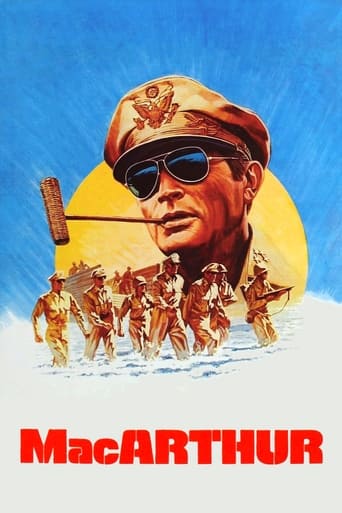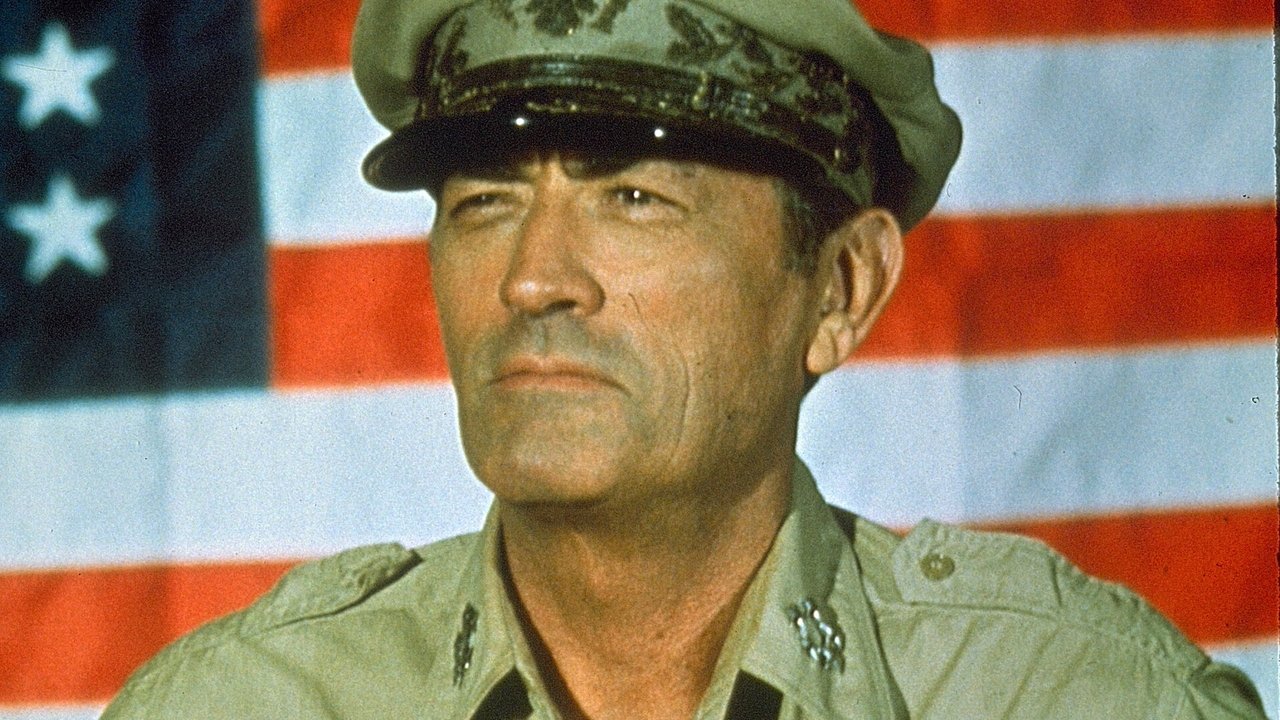SnoopyStyle
General Douglas MacArthur (Gregory Peck) is giving a speech to the cadets at West Point in 1962. Then the movie flashes back to Corregidor in 1942 Phillipines. It follows him through the war into Korean and his forced retirement by President Truman.This is a very sincere old fashion Hollywood telling of a complex man. Gregory Peck plays him as a sensitive, commanding and resolute man with daddy issues. Historians can quibble about its accuracy but it seems to be very Peck-like. The production skimps on the budget and this is no Patton. The action is lacking and there is a lot of old footage used. They don't even use the right A-bomb footage. More troubling is the fact that the movie stops before he goes into politics. The "Old soldiers never die" speech and Eisenhower's nomination pretty much end the movie. That's the part where his name literally becomes an ism. This is strictly a beginner's guide to MacArthur probably good for a substitute teacher in high school history class to play.
thinker1691
At the beginning of World War II, when the Japanese invaded the Phillipines, nearly 70,000 U.S and Filipino soldiers were taken captive, Gen. Douglas MacArthur the area commander, was taken out of harms way and awarded the Medal of honor. General Jonathan Wainwright who was taken prisoner by the enemy and forced to endure three brutal years in a P.O.W. camp did not. (He finally received it after the war despite MacArthur's disapproval) This movie is a Bio-pic of MacArthur (Gregory Peck) who is depicted as both a military figure as well as an administrator of Japan, after the war. Throughout his career he carved out both an impressive and imposing military figure as well as a controversial voice which many people admired. In conflict with President Harry S. Truman (Ed Flanders) over his decisions in Korea, the flamboyant general eventually was forced to retire. Although, having initial misgivings about his character, Gregory Peck nevertheless grudgingly came to respect the man. Today as then, the general has many admirers as well as detractors. For what it's worth, his last words resonate in the halls of West Point. A good film and one which is considered a classic by many military fans. Dan O'Herlihy does a superb job as President Franklin D. Roosevelt. ****
Bill Slocum
When George C. Scott played the title role in "Patton," you saw him directing tanks with pumps of his fist, shooting at German dive bombers with a revolver, and spewing profanity at superiors and subordinates alike. The most action we get from Gregory Peck as "MacArthur," a figure from the same war of debatably greater accomplishment, is when he taps mapboards with his finger and raises that famous eyebrow of his.Comparing Peck's performance with Scott's may be unfair. Yet the fact "MacArthur" was made by the same producer and scored by the same composer begs parallels, as does the fact both films open with the generals addressing cadets at West Point. It's clear to me the filmmakers were looking to mimic that Oscar-winning film of a few years before. But while Peck looks the part more than Scott ever did, he comes off as mostly bland in a story that feels less like drama than a Wikipedia walkthrough of MacArthur's later career."To this day there are those who think he was a dangerous demagogue and others who say he was one of the greatest men who ever lived," an opening title crawl tells us. It's a typical dishwater bit of post-Vietnam sophistry about those who led America's military, very much of its time, but what we get here is neither view. MacArthur as presented here doesn't anger or inspire the way he did in life.Director Joseph Sargent, who went on to helm the famous turkey "Jaws The Revenge," does a paint-by-numbers job with bland battle montages and some obvious set use (as when the Chinese attack U.S. forces in Korea), while the script by Hal Barwood and Matthew Robbins trots out a MacArthur who comes across as good-natured to the point of blandness, a bit too caught up in his public image, but never less than decent.Here you see him stepping off the landing craft making his return to the Phillipines. There you see him addressing Congress in his "Old Soldiers Never Die" speech. For a long stretch of time he sits in a movie theater in Toyko, waiting for the North Koreans to cross the 38th parallel so we can get on with the story while newsreel footage details Japan's rise from the ashes under his enlightened rule. Peck's co-actors, Marj Dusay as his devoted wife ("you're my finest soldier") and Nicolas Coaster as a loyal aide, burnish teary eyes in the direction of their companion's magnificence but garner no interest on their own.Even when he argues with others, Peck never raises his voice and for the most part wins his arguments with thunderous eloquence. When Admiral Nimitz suggests delaying the recapture of the Philippines, a point of personal pride as well as tactical concern for MacArthur, MacArthur comes back with the comment: "Just now, as I listened to his plan, I thought I saw our flag going down." Doubtless the real Nimitz would have had something to say about that, but the character in the movie just bows his head and meekly accepts the insult in the presence of President Roosevelt.The only person in the movie who MacArthur seriously disagrees with is Harry S Truman, who Ed Flanders does a fine job with despite a prosthetic nose that makes him resemble Toucan Sam. Truman's firing of MacArthur should be a dramatic high point, but here it takes place in a quiet dinner conversation, in which Peck plays MacArthur as nothing less than a genial martyr.I've never been sold by Peck's standing at the upper pantheon of screen stars; he delivers great presence but lacks complexity even in many of his best-known roles. But it's unfair to dock him so much here, as he gets little help defining MacArthur as anything other than a speechifying bore. Except for two scenes, one where he rails against the surrender of the Philippines ("He struck Old Glory and ran up a bedsheet!") and another where he has a mini-breakdown while awaiting the U.S. invasion of Inchon, inveighing against Communists undermining him at the White House, Peck really plays Peck here, not the complex character who inspired the famous sobriquet "American Caesar." The real MacArthur might have been worthy of such a comparison. What you get here is less worthy of Shakespeare than Shakes the Clown.
jpmd88
This Film was done in really poor taste. The script was really bad. I feel really sad for the late Gregory Peck who took on the title role of this B-movie adaptation of one of history's greatest generals. The movie was politically incorrect and downright insensitive to the others who fought the Japanese in World War 2. There was a scene where I almost vomited, it showed Macarthur in a bunker in Corregidor island talking to the troops like a seasoned politician when he comes across a wounded, one legged Filipino soldier. The soldier bleeding and dying manages to sit up straight upon seeing the general and says : `no papa, no mama, no uncle sam' and Macarthur gives his little pep talk that Americans `would never abandon' the Philippines. The scene ends with the soldier being invigorated by Macarthur's words and gives him a smart salute. I mean if there was a more condescending scene portraying the U.S. as the great white savior of the world please tell me because this one takes the cake. It showed that Filipinos are damsels in distress incapable of honor and have to rely on the great Americans solely for redemption. It blatantly and purposely overshadowed the contributions of the members of the USAFFE (United States Armed Forces of The Far East), these are Filipino volunteers that were integrated in the US military during world war 2, who died side by side with the Americans fighting the Japanese, who walked side by side with Americans in the death march of Bataan and defended Corregidor island by launching a guerilla offensive after Macarthur left for Australia with his famous `I shall return' speech. My late grandfather, a Filipino world war 2 veteran and USAFFE soldier was one of the many who fought the Japanese with honor and love for the home country. I think this movie does not give honor to them and to the thousands of others that Macarthur relied on for intelligence preparations for his famous return in the Leyte gulf landing.



 AD
AD




